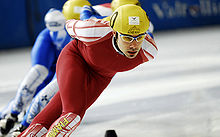Short track world records

Short track world records can be set over 500 meters, 1000 meters, 1500 meters, 3000 meters and in the relay and must be recognized by the International Skating Union (ISU) in order for them to be considered official. This article describes the regulations and shows the current world records. All historical world records can be found in the list of historical short track world records .
The first world records in the new speed skating discipline short track were set in March 1981, since then there have been a total of 76 world records for men and 81 for women. As the route length increases, the frequency of the newly established world records decreases. This is because the long distance races are often strategically shaped; many athletes do not run the entire distance as fast as they can. The Canadians have set most of the men's world records so far, but the South Koreans are currently the most successful. These currently (as of early 2010) hold four of the five possible world records for men. For women, four of the five record holders are currently from China. Overall, the women's world records have so far been mainly divided between the Chinese, South Koreans and Japanese.
Regulations
The ISU only recognizes world records over the distances that are run at major events. In the adult area these are the distances over 500, 1000, 1500 and 3000 meters as well as the relays. Only distances of 500, 1000 and 1500 meters apply to junior world records. No world records are set in the all-around or team competition, not even in races over 333 meters, which are only on the program for lower-class competitions. For a time to be recognized as a world record, several conditions must be met, which are laid down in ISU rule 292. This includes the following points:
- The records must be run on an official, ISU-compliant track. The dimensions of such a track are specified in another ISU rule, for example a lap must be exactly 111.12 meters long.
- The times must be electronically measured to the nearest thousandth of a second or it must be possible to determine precisely using a photo finish. This in turn should be substantiated by an original printout.
- The presence of an ISU referee and an ISU starter are required.
- For the long distances (1500 meters and more), the individual lap times must be documented.
- Participation in the competition that set the world record was possible for all ISU member states.
- For all other races in which participation is only possible to a limited extent (e.g. national championships), the organizer must forward a detailed announcement to the ISU General Secretariat four weeks before the event.
- The racing program (including the entire schedule) must match the announcement made previously.
- There is an official protocol of the competition, together with certification of the timing system and the track as well as the program of the race.
- Every athlete who sets a world record is required to show a negative doping test from the day of the competition.
- All necessary documents must be submitted to the ISU within 30 days of the competition.

Some of these points cannot be fulfilled in many competitions, so that so-called "unofficial world records" are more common. There are several examples of this in the last ten years: The Italian Fabio Carta ran in the Alta Valtellina Trophy in about 1500 meters 2: 13.553 minutes in November 2001 . Six weeks after this best time, Apolo Anton Ohno needed 2: 13.728 seconds for the same distance. Both times were well below the world record and although Carta was faster, Ohno's time was recognized as a new world record by the ISU. It is similar with Canadians, who often compete in national races on the fast ice rink in Calgary . If these are not in the official ISU calendar for the season, the best times established in such competitions are not considered world records. In December 2000, a year before Carta's "unofficial world record", the Canadian Jean-François Monette had also run faster than the existing world record over the same distance in Calgary. Monette's time was also not recognized as a world record, as the competition had not been registered with the ISU.
In addition to the above provisions, there are other guidelines for dealing with special cases in world records. If a world record is broken several times over the same distance within a competition, only the fastest time counts as a world record. This is crucial, for example, when skating a new ice rink with particularly fast ice for the first time. At the World Cup in Marquette in November 2009, the 500 meter world record would otherwise have been beaten several times in one day. In addition, set world records are also considered records; However, there has only been very seldom equality of time in the world records and is also unusual since the times are measured in thousandths of a second.
Current world records
| route | athlete | nation | date | place | time |
|---|---|---|---|---|---|
| 500 meters women | Elise Christie |
|
November 13, 2016 | Salt Lake City | 42.335 s |
| 500 meters men | John Celski |
|
October 21, 2012 | Calgary | 39.937 s |
| 1000 meters women | Shim Suk-hee |
|
October 21, 2012 | Calgary | 1: 26.661 min |
| 1000 meters men | Hwang Dae-heon |
|
November 12, 2016 | Salt Lake City | 1: 20.875 min |
| 1500 meters women | Choi Min-jeong |
|
November 12, 2016 | Salt Lake City | 2: 14.354 min |
| 1500 meters men | Sjinkie Knegt |
|
November 13, 2016 | Salt Lake City | 2: 07.943 min |
| 3000 meters women | Shim Suk-hee |
|
March 16, 2014 | Montreal | 4: 50.829 min |
| 3000 meters men | Jinkyu Noh |
|
March 19, 2011 | Warsaw | 4: 31.891 min |
| 3000 meters women's relay | Ha-Ri Cho , Min-jung Kim , Seung-hi Park , Suk Hee Shim |
|
December 9, 2012 | Shanghai | 4: 06.366 min |
| 5000 meters men's relay | Michael Gilday , Charles Hamelin , François Hamelin , Olivier Jean |
|
19th October 2012 | Calgary | 6: 30.958 min |
Historic world records
An overview of all the world records in the short track that have been officially recognized by the ISU so far as well as a statistical analysis of these can be found in the list of historical short track world records .
Individual evidence
- ^ Monette Charging Back, Leads at Canadian Short Track Trials ( Memento April 21, 2001 in the Internet Archive ) on speedskating.com. "The world record time is something you don't think about in the 1500 because it is usually strategic" ")
- ↑ INTERNATIONAL SKATING UNION - SPECIAL REGULATIONS & TECHNICAL RULES - SPEED SKATING and SHORT TRACK SPEED SKATING 2008 ( Memento from December 30, 2008 in the Internet Archive ) (pdf), on page 97 is Rule 292 , which deals with short track world records. An older, but basically hardly changed version of the rule with a German translation can be found here ( Memento of December 7, 2006 in the Internet Archive ).
- ↑ Internationale Nachrichten - January 2002 on packstyle.de.
- ^ Monette Charging Back, Leads at Canadian Short Track Trials ( Memento April 21, 2001 in the Internet Archive ) on speedskating.com.
- ↑ 500 meters: best times (Results from all years) on shorttrackonline.info. The ten best times all come from the World Cup in Marquette.
